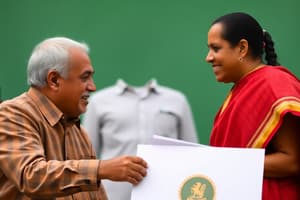Podcast
Questions and Answers
Which of the following best describes the power dynamic in Belgium's capital city, Brussels?
Which of the following best describes the power dynamic in Belgium's capital city, Brussels?
- Dutch-speaking people form a majority in both the country and the capital.
- Dutch-speaking people are a majority in the country but a minority in the capital. (correct)
- French-speaking people form a majority in both the country and the capital.
- French-speaking people are a majority in the country but a minority in the capital.
In Sri Lanka, the government policies favored Sinhala applicants for university positions and government jobs.
In Sri Lanka, the government policies favored Sinhala applicants for university positions and government jobs.
True (A)
What is 'Tamil Eelam' and what was the goal of the political organizations that demanded it in Sri Lanka?
What is 'Tamil Eelam' and what was the goal of the political organizations that demanded it in Sri Lanka?
Tamil Eelam refers to an independent state demanded by political organizations in Sri Lanka for the Tamil-speaking population in the northern and eastern parts of the country.
In Belgium, the constitution prescribes that the number of Dutch and French-speaking ministers shall be ______ in the central government.
In Belgium, the constitution prescribes that the number of Dutch and French-speaking ministers shall be ______ in the central government.
Match the community with the post reserved for them according to the power-sharing rules in Lebanon:
Match the community with the post reserved for them according to the power-sharing rules in Lebanon:
According to the chapter, what is the basic principle of democracy?
According to the chapter, what is the basic principle of democracy?
In a federal system, the central government is subordinate to the state governments.
In a federal system, the central government is subordinate to the state governments.
What is meant by 'horizontal distribution of power,' and what is its purpose?
What is meant by 'horizontal distribution of power,' and what is its purpose?
The system of checks and balances ensures that none of the organs of government can exercise ______ power.
The system of checks and balances ensures that none of the organs of government can exercise ______ power.
Match the term with its description:
Match the term with its description:
Which action represents an intelligent sharing of power in a democracy?
Which action represents an intelligent sharing of power in a democracy?
Majoritarianism respects the needs and wishes of minority communities within a country.
Majoritarianism respects the needs and wishes of minority communities within a country.
What led to tensions between the Dutch-speaking and French-speaking communities in Belgium?
What led to tensions between the Dutch-speaking and French-speaking communities in Belgium?
In Sri Lanka, an Act was passed to recognize ______ as the only official language.
In Sri Lanka, an Act was passed to recognize ______ as the only official language.
Match the type of government with its level:
Match the type of government with its level:
In Belgium, what does 'community government' refer to?
In Belgium, what does 'community government' refer to?
Power sharing is only important for countries with significant ethnic or linguistic diversity.
Power sharing is only important for countries with significant ethnic or linguistic diversity.
What is the civil war mentioned about Sri Lanka, and when did it end?
What is the civil war mentioned about Sri Lanka, and when did it end?
In modern democracies, power-sharing arrangements can take ______ forms.
In modern democracies, power-sharing arrangements can take ______ forms.
Match the concept with the country that represents it:
Match the concept with the country that represents it:
Flashcards
Horizontal power sharing
Horizontal power sharing
Sharing power among different organs of government like legislature, executive, and judiciary.
Vertical power sharing
Vertical power sharing
Power division among different levels of government: central, state, and local.
Community government
Community government
A government elected by people belonging to one language community with power over cultural, educational and language issues.
Coalition government
Coalition government
Signup and view all the flashcards
Majoritarianism
Majoritarianism
Signup and view all the flashcards
Civil war
Civil war
Signup and view all the flashcards
Prudential
Prudential
Signup and view all the flashcards
Ethnic
Ethnic
Signup and view all the flashcards
Checks and Balances
Checks and Balances
Signup and view all the flashcards
Why power Sharing is Desirable
Why power Sharing is Desirable
Signup and view all the flashcards
Basic Principle of Democracy
Basic Principle of Democracy
Signup and view all the flashcards
Belgium's Power Sharing
Belgium's Power Sharing
Signup and view all the flashcards
Sri Lanka's Majoritarianism
Sri Lanka's Majoritarianism
Signup and view all the flashcards
Study Notes
Power-Sharing
- Power distribution among the legislature, executive, and judiciary is crucial for democracy.
- The chapter uses stories from Sri Lanka and Belgium to explore power-sharing.
- It examines how democracies manage power-sharing demands to form general conclusions about its necessity.
- Power-sharing forms are discussed for review in subsequent chapters.
Belgium and Sri Lanka
- Belgium is a small European country bordering France, the Netherlands, Germany, and Luxembourg, and has a population of over one crore.
- Ethnicity in Belgium is complex: 59% live in the Flemish region and speak Dutch, 40% in Wallonia speak French, and 1% speak German.
- Brussels, the capital, has 80% French speakers and 20% Dutch speakers.
- The minority French speakers were rich and powerful, causing resentment from the Dutch speakers, leading to tensions in the 1950s and 1960s
- Tensions are acute in Brussels, where Dutch speakers are the majority in the country but a minority in the capital.
- Sri Lanka is an island nation off the coast of Tamil Nadu with a population of about two crore.
- Sri Lanka's population is diverse, with Sinhala speakers (74%) and Tamil speakers (18%) as major groups.
- Tamil speakers are divided into Sri Lankan Tamils and Indian Tamils.
Majoritarianism in Sri Lanka
- Sri Lanka became independent in 1948 and Sinhala leaders sought dominance.
- The government adopted majoritarian measures to establish Sinhala supremacy.
- In 1956, an Act recognized Sinhala as the official language, disregarding Tamil
- Preferential policies favored Sinhala applicants for university positions and government jobs.
- The new constitution mandated the state to protect and foster Buddhism.
- These measures increased alienation among Sri Lankan Tamils.
- Political parties led by Buddhist Sinhala leaders were insensitive to Tamil language and culture.
- Tamils felt the constitution and government policies denied equal rights, discriminated in jobs, and ignored interests.
Accommodation in Belgium
- Relations between Sinhala and Tamil communities were strained over time as a result.
- Sri Lankan Tamils launched parties and struggles for Tamil to be recognized as an official language.
- The Tamils called for regional autonomy and equal opportunity in education and jobs, but their demands were repeatedly denied.
- By the 1980s, political organizations demanded an independent Tamil state (Tamil Eelam) in northern and eastern Sri Lanka.
- The distrust between communities turned to conflict, leading to the civil war, which concluded in 2009.
- Belgian leaders recognized regional differences and cultural diversity.
- Between 1970 and 1993, the constitution was amended four times to enable all to live together.
- The constitution states that the number of Dutch and French-speaking ministers must be equal in the central government.
- Special laws require majority support from each linguistic group, so no single community makes decisions unilaterally.
- Powers of the Central Government were given to State Governments of the two regions, so State Governments are not subordinate to the Central Government.
- Brussels has a separate government with equal representation for both communities.
Power Sharing
- Apart from the Central and State Government, there is a third government, the 'community government'.
- It is elected by people belonging to one language community, having power over cultural, educational, and language issues.
- The Belgian arrangements have worked well and helped avoid civic strife and possible division.
- Unity is achieved by respecting the feelings and interests of all communities.
- Sri Lanka showed what can happen when a majority community forces dominance and refuses to share power
- Power sharing is good because it reduces conflict between social groups and the possibility of violence and political instability.
- Imposing the will of the majority may seem attractive in the short run, but in the long run, it undermines the nation’s unity.
- Power-sharing is democratic because it involves sharing power with those affected by its exercise.
- Prudential reasons stress better outcomes, while moral reasons emphasize the value of power-sharing itself.
Forms of Power-Sharing
- Power-sharing opposes undivided political power, and should be distributed among as many citizens as possible.
- Power is shared among different organs of government, such as the legislature, executive and judiciary.
- Horizontal distribution of power allows organs at the same level to exercise different powers, resulting in a balance of power.
- Power is shared among governments at different levels, such as a general government for the entire country and governments at the provincial or regional level.
- The governments at the provincial or regional level are called by different names in different countries.
- In India, the levels are called State Governments and the Central or Union Government.
- This is called vertical division of power.
- Power can be shared among different social groups such as religious and linguistic groups.
- Community government in Belgium is a good example of this arrangement.
- Societies use arrangements that give space in the government and administration to diverse social groups, in order that they don't feel alienated.
- Power is also shared in the way political parties, pressure groups, and movements control or influence those in power.
- Competition ensures that power does not remain in one hand.
- Power is shared among parties representing different ideologies and social groups.
- Coalitions exist where two or more parties form an alliance and if elected, create a coalition government.
- Interest groups, such as traders, businessmen, industrialists, farmers, and industrial workers also have a share in governmental power.
Studying That Suits You
Use AI to generate personalized quizzes and flashcards to suit your learning preferences.




